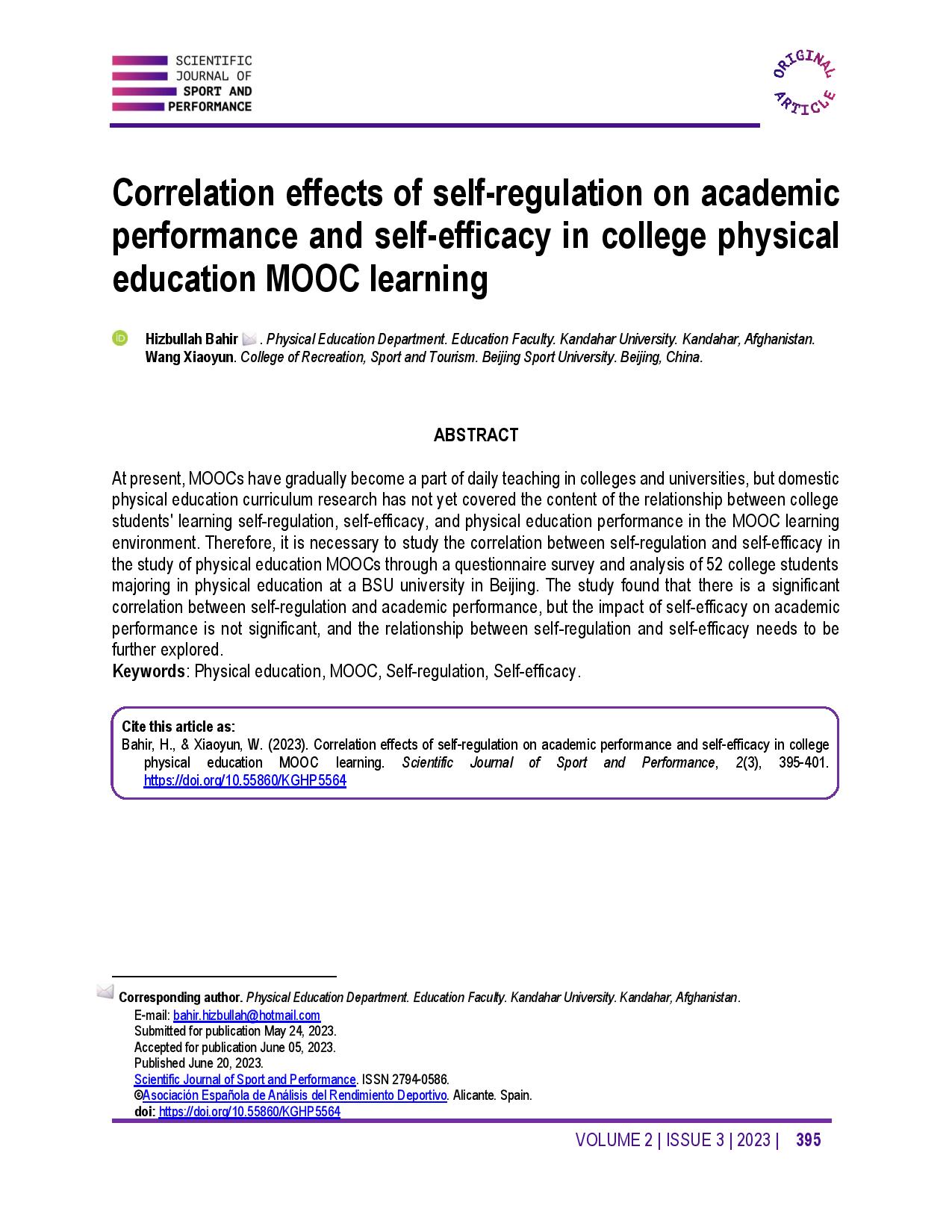Correlation effects of self-regulation on academic performance and self-efficacy in college physical education MOOC learning
Main Article Content
Abstract
At present, MOOCs have gradually become a part of daily teaching in colleges and universities, but domestic physical education curriculum research has not yet covered the content of the relationship between college students' learning self-regulation, self-efficacy, and physical education performance in the MOOC learning environment. Therefore, it is necessary to study the correlation between self-regulation and self-efficacy in the study of physical education MOOCs through a questionnaire survey and analysis of 52 college students majoring in physical education at a BSU university in Beijing. The study found that there is a significant correlation between self-regulation and academic performance, but the impact of self-efficacy on academic performance is not significant, and the relationship between self-regulation and self-efficacy needs to be further explored.
Article Details

This work is licensed under a Creative Commons Attribution-NonCommercial-ShareAlike 4.0 International License.
References
An, F. P., Balantekin, A. B., Band, H. R., Bishai, M., Blyth, S., Butorov, I., Cao, D., Cao, G. F., Cao, J., Cen, W. R., Chan, Y. L., Chang, J. F., Chang, L. C., Chang, Y., Chen, H. S., Chen, Q. Y., Chen, S. M., Chen, Y. X., Chen, Y., … Zou, J. H. (2016). Measurement of the reactor antineutrino flux and spectrum at Daya Bay. Physical Review Letters, 116(6). https://doi.org/10.1103/PhysRevLett.116.061801 DOI: https://doi.org/10.1103/PhysRevLett.116.061801
Chang, C. Y., Panjaburee, P., Lin, H. C., Lai, C. L., & Hwang, G. H. (2022). Effects of online strategies on students' learning performance, self-efficacy, self-regulation and critical thinking in university online courses. Educational Technology Research and Development, 70(1), 185-204. https://doi.org/10.1007/s11423-021-10071-y DOI: https://doi.org/10.1007/s11423-021-10071-y
Dembo, M. H., & Seli, H. P. (2004). Students’ Resistance to Change in Learning Strategies Courses. Journal of Developmental Education, 27(3), 2–11. Retrieved from: http://www.jstor.org/stable/42775155
Godoy Garraza, L., Kuiper, N., Goldston, D., McKeon, R., & Walrath, C. (2019). Long-term impact of the Garrett Lee Smith Youth Suicide Prevention Program on youth suicide mortality, 2006-2015. Journal of Child Psychology and Psychiatry and Allied Disciplines, 60(10), 1142-1147. https://doi.org/10.1111/jcpp.13058 DOI: https://doi.org/10.1111/jcpp.13058
Milligan, C., & Littlejohn, A. (2016). How health professionals regulate their learning in massive open online courses. The Internet and Higher Education, 31(3), 113-121. https://doi.org/10.1016/j.iheduc.2016.07.005 DOI: https://doi.org/10.1016/j.iheduc.2016.07.005
Muñoz-Merino, P. J., Ruipérez-Valiente, J. A., Alario-Hoyos, C., Pérez-Sanagustín, M., & Delgado Kloos, C. (2015). Precise Effectiveness Strategy for analyzing the effectiveness of students with educational resources and activities in MOOCs. Computers in Human Behavior, 47, 108–118. https://doi.org/https://doi.org/10.1016/j.chb.2014.10.003 DOI: https://doi.org/10.1016/j.chb.2014.10.003
Rosen, R. L., Levy-Carrick, N., Reibman, J., Xu, N., Shao, Y., Liu, M., Ferri, L., Kazeros, A., Caplan-Shaw, C. E., Pradhan, D. R., Marmor, M., & Galatzer-Levy, I. R. (2017). Elevated C-reactive protein and posttraumatic stress pathology among survivors of the 9/11 World Trade Center attacks. Journal of Psychiatric Research, 89, 14-21. https://doi.org/10.1016/j.jpsychires.2017.01.007 DOI: https://doi.org/10.1016/j.jpsychires.2017.01.007
Venitz, L., & Perels, F. (2019). Promoting self-regulated learning of preschoolers through indirect intervention: a two-level approach. Early Child Development and Care, 189(13), 2057-2070. https://doi.org/10.1080/03004430.2018.1434518 DOI: https://doi.org/10.1080/03004430.2018.1434518
Wu, A., Peng, Y., Huang, B., Ding, X., Wang, X., Niu, P., Meng, J., Zhu, Z., Zhang, Z., Wang, J., Sheng, J., Quan, L., Xia, Z., Tan, W., Cheng, G., & Jiang, T. (2020). Genome Composition and Divergence of the Novel Coronavirus (2019-nCoV) Originating in China. In Cell Host and Microbe (Vol. 27, Issue 3, pp. 325-328). Springer US. https://doi.org/10.1016/j.chom.2020.02.001 DOI: https://doi.org/10.1016/j.chom.2020.02.001
Zainuddin, Z., & Halili, S. H. (2016). Flipped Classroom Research and Trends from Different Fields of Study. The International Review of Research in Open and Distributed Learning, 17(3). https://doi.org/10.19173/irrodl.v17i3.2274 DOI: https://doi.org/10.19173/irrodl.v17i3.2274




